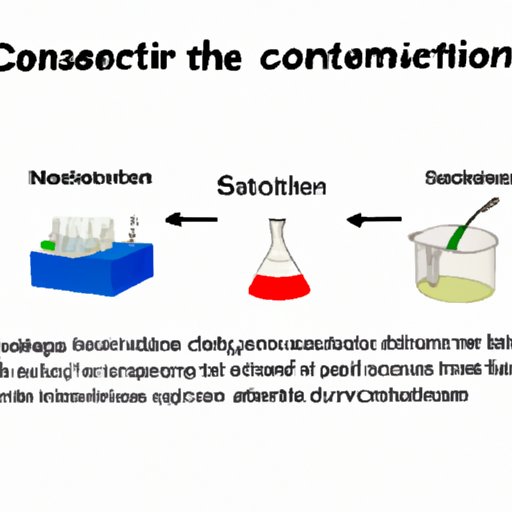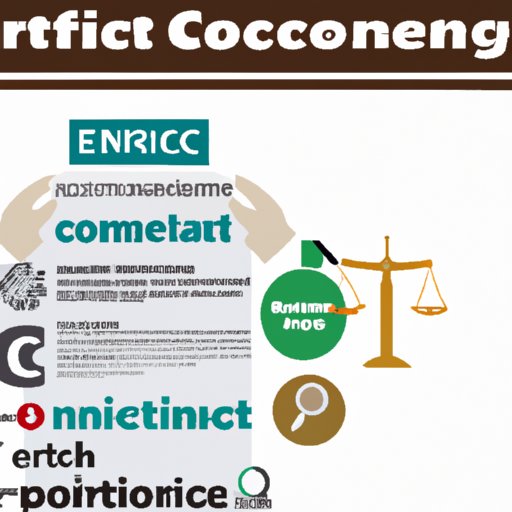
An Overview of Conduct in Science
Conduct in science is a term used to describe the ethical standards that should be followed by scientists when conducting research. It refers to the moral principles and behaviors that should be observed in order to ensure that research is conducted in an honest and responsible manner. In recent years, there has been increasing attention paid to the ethical implications of scientific research, with many organizations establishing codes of conduct to ensure that research is conducted ethically and responsibly.
Definition of Conduct in Science
Conduct in science is defined as “the set of values, norms, and rules governing the behavior of scientists and other professionals involved in scientific research” (American Psychological Association, 2017). This includes the ethical principles of honesty, integrity, respect, responsibility, and fairness, as well as the moral obligations to uphold these values when conducting research. Conduct in science also encompasses the expectations of professional behavior, including behaving in a trustworthy and impartial manner, maintaining high standards of quality and accuracy, and avoiding conflicts of interest.

Types of Unethical Conduct in Science
Unethical conduct in science can take various forms, including fabrication or falsification of data, plagiarism, copyright infringement, misuse of resources, and failure to adhere to institutional policies. These behaviors are considered unacceptable by the scientific community and can have serious consequences for those who engage in them. For example, a scientist found guilty of fabricating or falsifying data may face disciplinary action or even criminal prosecution.

Examples of Ethical Practices in Science
Ethical practices in science include following established protocols for conducting research, adhering to institutional policies, respecting intellectual property and copyrights, and properly attributing sources. Scientists must also take steps to ensure the accuracy and reproducibility of their results, and they should always be open and honest about any potential conflicts of interest. Finally, scientists should treat their colleagues and collaborators with respect and should not engage in any discriminatory or harassing behavior.
The Importance of Ethical Practices in Science
Ethical practices in science are essential to ensure the quality and integrity of research. Without these practices, it is impossible to guarantee the accuracy and reliability of results, which can lead to incorrect conclusions and false claims. Furthermore, unethical practices can damage the reputation of science and erode public trust in its findings.
How Ethical Practices Help Ensure Quality Results
By adhering to ethical practices, scientists can ensure the quality and validity of their results. For instance, by following established protocols for conducting experiments and collecting data, scientists can reduce the risk of errors and bias. They can also ensure that their results are accurate and reproducible by properly documenting their methods and data.

Protecting the Reputation of Science
Unethical practices can have a damaging effect on the reputation of science, undermining public trust in its findings and leading to a loss of credibility. According to a Nature survey (Nature, 2014), more than half of respondents believe that misconduct is a serious problem in science, and more than 80% think that such misconduct should be punished. As such, it is important for scientists to uphold ethical standards and take steps to protect the reputation of science.
Benefits of Following Ethical Guidelines
Adhering to ethical guidelines can also bring numerous benefits to scientists. By following proper protocols and procedures, scientists can ensure the quality and accuracy of their results, protect their own reputations, and enhance collaboration and innovation within the scientific community. Additionally, by being open and honest about their work, scientists can build trust and gain public support for their research.
Guidelines for Professional Conduct in Science
There are several guidelines that scientists should follow in order to ensure ethical practices in science. These include:
Respect for Intellectual Property
Scientists should respect the intellectual property rights of others and obtain permission before using copyrighted materials. They should also properly attribute sources when using the work of others.
Adherence to Institutional Policies
Scientists should adhere to all relevant institutional policies, including those related to data storage and sharing, conflict of interest, animal welfare, and human subjects research.
Appropriate Use of Resources
Scientists should use their resources responsibly, taking steps to conserve energy and materials and minimize waste. They should also strive to use resources efficiently, ensuring that they are not wasted or misused.
Responsible Disclosure of Data
Scientists should be transparent and open about their data and results, making sure to disclose any potential biases or conflicts of interest. They should also be mindful of the potential risks associated with disclosing sensitive information.
Exploring the Role of Integrity in Scientific Research
Integrity is a core value in scientific research and is essential for ensuring the accuracy and reliability of results. To maintain integrity in their work, scientists must strive to be honest, impartial, and objective in their research. They should also be open and transparent about their methods and data, and they should take steps to ensure the accuracy and reproducibility of their results.
Integrity as a Core Value in Research
Integrity is a fundamental value in science, and it is essential for ensuring the accuracy and reliability of results. According to a study published in PLOS Biology (Vasilevsky et al., 2016), “integrity is the foundation of scientific research, and without it, the whole enterprise of science would collapse.”
Establishing Clear Communication and Collaboration
In addition to being honest and impartial, scientists should strive to establish clear communication and collaboration with their colleagues and collaborators. This includes being respectful of each other’s opinions and ideas, engaging in constructive dialogue, and avoiding any conflicts of interest. This will help to ensure the accuracy and reliability of results and foster collaboration and innovation within the scientific community.
Ensuring Accuracy and Reproducibility in Research
Finally, scientists should take steps to ensure the accuracy and reproducibility of their results. This includes documenting their methods and data, following established protocols for conducting experiments and collecting data, and testing their results to confirm that they are valid and reliable. By doing so, scientists can ensure that their results are accurate and reproducible.
Examining the Impact of Unethical Conduct in Science
Unethical conduct in science can have serious consequences for those who engage in it, as well as for the scientific community as a whole. It can lead to inaccurate and unreliable results, damage the reputation of science, and undermine public trust in its findings.
Negative Consequences of Unethical Conduct
Unethical conduct in science can have a number of negative consequences, ranging from disciplinary action to criminal prosecution. A study published in PLOS Medicine (Kimmel et al., 2012) found that scientists who engage in unethical practices are more likely to be sanctioned or fired and are less likely to receive funding or grants.
Legal Implications of Unethical Practices
In some cases, unethical conduct in science can have legal implications. For example, if a scientist is found to have fabricated or falsified data, they could face criminal charges and possible jail time. Furthermore, those who engage in unethical practices may be subject to civil lawsuits and financial penalties.
Damage to Public Perception of Science
Unethical practices can also have a damaging effect on the public perception of science. According to a Nature survey (Nature, 2014), more than half of respondents believe that misconduct is a serious problem in science and more than 80% think that such misconduct should be punished. As such, it is essential for scientists to uphold ethical standards and take steps to protect the reputation of science.
Debating the Need for a Code of Conduct in Science
There has been much debate over whether a code of conduct should be implemented in science. Proponents argue that a code of conduct would help to ensure that scientists adhere to ethical standards, while opponents argue that it would be difficult to enforce and could stifle creativity and innovation.
Advantages of Implementing a Code of Conduct
Proponents of a code of conduct argue that it would help to ensure ethical practices in science and protect the reputation of science. A code of conduct would make it easier to identify and punish those who engage in unethical practices, and it would provide a clear set of standards for scientists to follow. Additionally, a code of conduct could help to foster collaboration and innovation within the scientific community.
Challenges of Enforcing a Code of Conduct
Opponents of a code of conduct argue that it would be difficult to enforce and could lead to unnecessary bureaucracy. Furthermore, they argue that it could stifle creativity and innovation, as scientists may be reluctant to pursue unconventional ideas for fear of violating the code of conduct.
Necessity of Education and Training
Despite the challenges posed by a code of conduct, proponents argue that it is still necessary to ensure ethical practices in science. To this end, they suggest that education and training should be provided to scientists on the importance of ethical practices and how to adhere to them. This would help to ensure that scientists understand the importance of ethical practices and are able to comply with the code of conduct.

Understanding the Benefits of Good Conduct in Science
Good conduct in science is essential for protecting the reputation of science and fostering trust in its findings. By adhering to ethical standards and taking steps to ensure the accuracy and reliability of results, scientists can promote a positive image of science and encourage openness, accountability, and transparency.
Promoting a Positive Image of Science
Good conduct in science helps to promote a positive image of science and encourages public trust in its findings. By adhering to ethical standards and taking steps to ensure the accuracy and reliability of results, scientists can show that science is conducted responsibly and ethically.
Encouraging Openness, Accountability and Transparency
Good conduct in science also encourages openness, accountability, and transparency in research. By being open and honest about their methods and data, scientists can ensure that their results are accurate and reproducible. Additionally, by disclosing any potential conflicts of interest, scientists can demonstrate that their work is impartial and unbiased.
Enhancing Collaboration and Innovation
Finally, good conduct in science can help to enhance collaboration and innovation within the scientific community. By treating their colleagues and collaborators with respect and avoiding any conflicts of interest, scientists can foster a collaborative and supportive environment where new ideas can flourish.
Fostering Trust in Science and its Findings
Good conduct in science is essential for fostering trust in science and its findings. By adhering to ethical standards and taking steps to ensure the accuracy and reliability of results, scientists can demonstrate that science is conducted responsibly and ethically, and they can help to restore public trust in its findings.
(Note: Is this article not meeting your expectations? Do you have knowledge or insights to share? Unlock new opportunities and expand your reach by joining our authors team. Click Registration to join us and share your expertise with our readers.)
